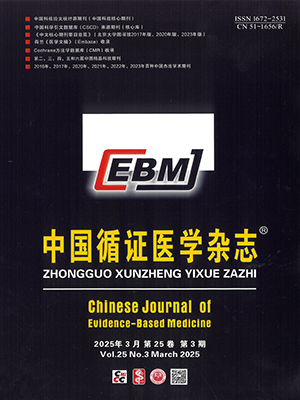| 1. |
罗伯特·伯特德威利斯. 量表编制: 理论与应用(第3版). 重庆: 重庆大学出版社, 2016.
|
| 2. |
马雪颜, 于河, 吴力群, 等. 儿童胃肠积热评价性量表的研制. 北京中医药大学学报, 2020, 43(2): 171-176.
|
| 3. |
陈炳为, 许碧云, 倪宗瓒, 等. 证实性因子分析在量表信度中的应用研究. 中国卫生统计, 2005, 4: 261-263.
|
| 4. |
柴智明. 外科手术学实验教程(第2版). 合肥: 中国科学技术大学出版社, 2020.
|
| 5. |
Nagata C, Ido M, Shimizu H, et al. Choice of response scale for health measurement: comparison of 4, 5, and 7-point scales and visual analog scale. J Epidemiol, 1996, 6(4): 192-197.
|
| 6. |
Zhou L, Su B, Liu S, et al. Development and validation of the perioperative recovery scale for integrative medicine. Tradit Med Res, 2019, 4(4): 184-194.
|
| 7. |
王佳佳, 谢洋, 李建生. 临床结局测评工具修订的现状及流程思考: 以慢性阻塞性肺疾病患者报告结局量表修订为例. 中国全科医学, 2020, 23(29): 3644-3648.
|
| 8. |
罗照盛. 项目反应理论基础. 北京: 北京师范大学出版社, 2012.
|
| 9. |
韩耀风, 郝元涛, 方积乾. 项目反应理论及其在生存质量研究中的应用. 中国卫生统计, 2006, 23(6): 562-565.
|
| 10. |
李佳玲, 赵艳霞, 顾菁, 等. 基于项目反应理论修订生存质量测定量表简表WHOQOL-BREF. 中山大学学报(医学科学版), 2015, 36(2): 284-293.
|
| 11. |
漆书青, 戴海崎, 丁树良, 等. 现代教育与心理测量学原理. 北京: 高等教育出版社, 2002.
|
| 12. |
庞海玉, 康琳, 刘雅茹. 基于项目反应理论的老年医学知信行量表条目分析与评价. 基础医学与临床, 2019, 39(8): 1108-1113.
|
| 13. |
Cattell RB. The scree test for the number of factors. Multivariate Behav Res, 1966, 1(2): 245-276.
|
| 14. |
Loehlin JC. Latent variable models: an introduction to factor, path, and structural equation analysis: fourth edition. J Educ Behav Stat, 2004, 12(4).
|
| 15. |
Rizopoulos D. ltm : an r package for latent variable modeling and item response theory analyses. J Stat Softw, 2006, 17(5): i11.
|
| 16. |
Linden W, Hambleton RK. Handbook of modern item response theory. J Am Stat Assoc, 1997, 92(439): 245-256.
|
| 17. |
陈其城, 蒋志, 曹立幸, 等. 基于德尔菲法的围手术期术后脾胃气虚气滞证诊断标准的建立. 中国中西医结合外科杂志, 2023, 29(4): 463-468.
|
| 18. |
朱琳. 基于CTT和IRT的慢性乙肝患者生命质量量表(CHBQOL)的研制与测量性能评价. 杭州: 浙江大学, 2020.
|
| 19. |
杨业兵. 应用项目反应理论对《中国士兵人格测验》的项目分析及计算机自适应施测方案. 西安: 第四军医大学, 2008.
|
| 20. |
臧运洪, 赵守盈, 陈维, 等. 用项目反应理论修订父母同伴依恋量表. 贵州师范大学学报(自然科学版), 2012, 30(2): 22-27.
|
| 21. |
周娟. IRT中项目参数的估计精度和DIF检验. 重庆: 西南大学, 2014.
|
| 22. |
巫小玉, 于磊, 万崇华, 等. 基于经典测量理论与项目反应理论的慢性胃炎生命质量测定量表QLICD-CG(V2. 0)条目分析. 现代预防医学, 2021, 48(19): 3626-3631.
|
| 23. |
Felder S. Item response theory analysis of the pain self-efficacy questionnaire. Scand J Pain, 2017, 14(1): 113-117.
|
| 24. |
Yang F, Zhao F, Zheng Y, et al. Modification and verification of the infant-toddler meaningful auditory integration scale: a psychometric analysis combining item response theory with classical test theory. Health Qual Life Outcomes, 2020, 18(1): 367.
|
| 25. |
Costa DSJ, Asghari A, Nicholas MK. Item response theory analysis of the pain self-efficacy questionnaire. Scand J Pain, 2017, 14(1): 118.
|
| 26. |
张传猛, 万崇华, 杨铮, 等. 冠心病患者报告结局量表信度分析. 中国全科医学, 2019, 22(11): 1350-1354.
|
| 27. |
刘叶, 鲁杰, 李顶春, 等. 基于经典测量理论和项目反应理论对慢性病毒性肝炎患者生命质量量表的评价. 临床肝胆病杂志, 2022, 38(11): 2470-2477.
|
| 28. |
申子宜, 冉昱, 何伟林, 等. 基于项目反应理论修订中文版VoiSS量表. 中国卫生统计, 2018, 35(6): 831-833.
|
| 29. |
刘蓓蓓. 基于IRT的中国大学生心理健康筛查量表分析及DIF检测. 成都: 西南交通大学, 2021.
|
| 30. |
Kim-O MA, Embretson SE. Item response theory and its application to measurement in behavioral medicine. New York: Springer, 2010.
|
| 31. |
陈冠宇, 陈平. 解释性项目反应理论模型: 理论与应用. 心理科学进展, 2019, 27(5): 937-950.
|
| 32. |
陈颖, 侯晓辉, 宁艳, 等. 中国公众公共卫生安全素养自制量表的项目功能差异检验. 中国健康教育, 2022, 38(6): 511-516.
|
| 33. |
梁敏洪, 付希婧, 高鹏, 等. 生命质量量表EQ-5D与SF-6D的比较. 中国卫生经济, 2014, 3(3): 9-11.
|
| 34. |
李佩佩. MELQO早期儿童数学能力量表的测量学研究. 金华: 浙江师范大学, 2020.
|
| 35. |
庄云珠, 万崇华, 杨铮, 等. 基于经典测量理论与项目反应理论的药物成瘾生命质量测定量表QLICD-DA(V2. 0)条目分析. 现代预防医学, 2022, 49(5): 778-782.
|
| 36. |
梁长业, 周宇, 于磊, 等. 基于经典测量理论与项目反应理论的消化性溃疡生命质量测定量表QLICD-PU(V2. 0)条目分析. 现代预防医学, 2022, 49(17): 3234-3240.
|
| 37. |
王彬. 冠心病痰浊证中医诊断量表的研制及评价. 广州: 广州中医药大学, 2020.
|




